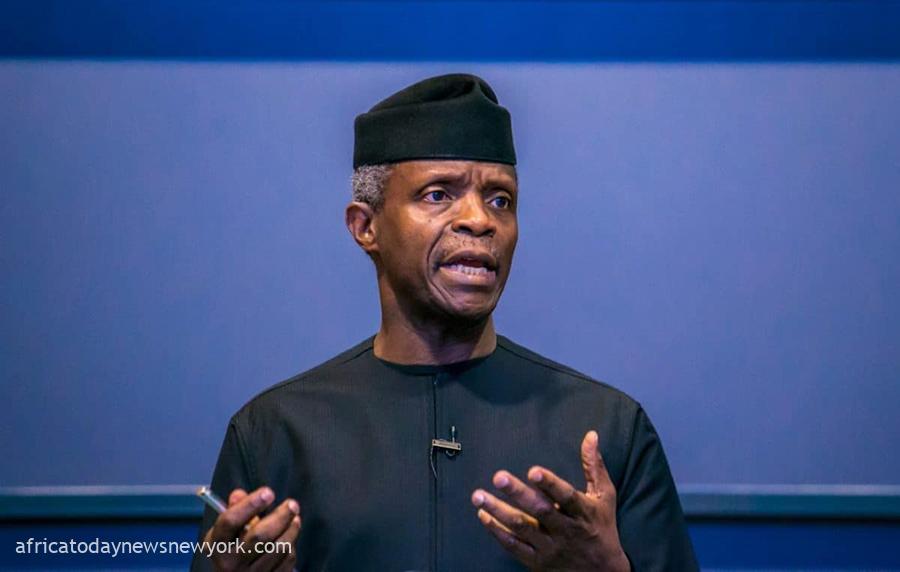A former Vice President of Nigeria, Yemi Osinbajo (SAN), has postulated that with focus on renewable energy resources, Nigeria and the rest of Africa could well reduce their energy costs by 30 per cent and lower carbon emissions by 90 per cent.
Osinbajo, who is the global advisor of the Global Energy Alliance for People and Planet (GEAPP), gave the highlight while delivering his address titled: ‘Climate Positive Growth: Africa as a Climate Action Partner for the UAE And the World,’ at the New York University (NYU), Abu Dhabi Campus, UAE.
Africa Today News, New York reports that the GEAPP is an international organisation committed to supporting the global community to meet critical climate goals during the next decade.
The ex-university lecturer, also gave four conditions to realise climate-positive growth and create a green industrial region of the world, urging African countries to focus their economic growth and development plans on green opportunities.
According to him, if Africa processed the bauxite it mines alone, which is 25 per cent of global bauxite production, to aluminium with renewable energy before exporting it, it could save 335 million tonnes of CO2 per year, create 280,000 jobs and generate $37 billion additional revenue for the continent.
‘In fact, by aggressively deploying its renewable energy resources, Africa can provide energy to all Africans, 600 million of whom currently do not have access to energy and 150 million of whom have unreliable access to energy, at a 30 per cent lower cost and with over 90 per cent lower emissions per KWH, compared to the current stated policy.
‘Africa’s renewable energy is not only abundant but also has very low seasonality, or intermittency which makes it possible to reliably provide renewable base-load, to power continuous industrial production.
“Strikingly, the lowest-cost set-up of solar, wind, and battery storage to get reliable base-load to power industry, is twice as expensive in Germany as it is in Nigeria,’ the former VP said.
Read Also: South African Music Icon Zahara Passes Away At 36
Osinbajo contended that African countries need to focus their economic growth and development plans on green opportunities, structure their policy and regulations in ways that support green industrialisation.
Stressing that Africa is home to 60 per cent of the world’s best solar resources, and, in addition, has abundant wind, geothermal, and hydro potential, Osinbajo explained that Africa’s untapped renewable energy potential is 50 times the anticipated global demand for electricity in 2040.
‘In other words, Africa is perhaps the only region today, ironically on account of its low development base that can truly achieve green growth and economic growth without growing emissions, or even keeping emissions constant, but actively addressing the reduction of emissions and the concentration of greenhouse gases in the atmosphere,’ Osinbajo said.
He called for fair and equitable market access to meet global demand for green products, services and carbon credits.
At the current price of 50 cents to a few dollars per tonne in the voluntary carbon market, the former Nigerian number two man, said it was simply impossible to generate quality credits.
He added: ‘Price needs to cover the costs of developing a project, generating and trading the credit, conducting proper monitoring and evaluation, paying taxes and generating viable returns for all stakeholders involved, from local communities to project developers to the providers of risk capital.’
On financing, he said that to access the right quantum of capital, with the cost of capital in Africa still high, African governments pay five times as much interest in the bond market as they would if the multilateral development banks were properly capitalised.
“The cost of borrowing for African countries is probably the highest of any region. Those seeking investments for private projects face high costs of capital and unhelpfully short tenures, driven by both real and perceived risk factors,” he explained.
Addressing this, he said, requires a whole range of interventions, including keeping past promises, plus the operationalisation of the Loss and Damage Fund agreed last year at COP27 and the commitment to $100 billion a year in climate finance for developing countries.
He further called for the reform of the international financial architecture, ensuring more of their deployment goes to emerging and frontier economies, and drive more deployment towards climate-aligned investments.
